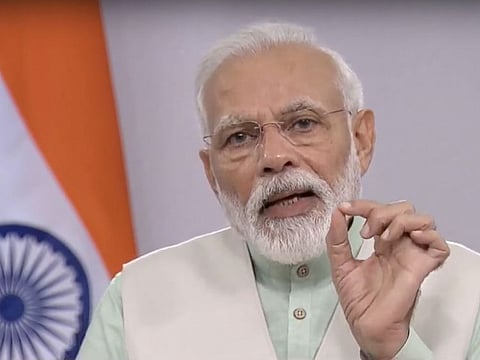On PM-CARES, Modi needs to answer some questions
India expects full disclosure from Prime Minister on fund to combat coronavirus outbreak

We know that India’s Prime Minister Modi has a penchant for sartorial elegance and is particularly partial to head gear. His pet obsession however is: coining acronyms. His latest, ‘PM Cares (Citizen Assistance and Relief in Emergency Situations) Fund, to raise money to fight Covid-19 pandemic, is possibly his best.
This acronym is a master stroke: It tells us that the existential challenge facing India is, up close and personal, and he cares and feels for his flock: A man who works around the clock for India. He wears his love for the country on his sleeve, and more.
Even a Modi hater will concede that the Prime Minister has flair when it comes to creating hype, or sloganeering; there is simply none to equal him. His one-time mentor, L.K. Advani, tongue in cheek, called him a ‘good event manager’
His critics uncharitably call all this: megalomania on steroids. Imagine his pinstriped signature suit by Savile row merchant, Holland & Sherry with his own name, over and over it, when Obama came visiting?
But we are being unfair? Funds are flowing in, and all thanks to that acronym ‘PM Cares’. For would another appellation have triggered such a surge? Maybe not. India’s richest billionaire Mukesh Ambani pledged 500 Crores, Ratan Tata, India’s czar of salt to software group committed a similar amount and actor Akshay Kumar donated 25 Crores.
And all this happened with a few minutes of this appeal going online. The Bard said ‘A rose by any other name would smell as sweet’, but that was before he had heard of Modi. Imagine the acronym PMNRF, would it have evoked a similar gush?
Even a Modi hater will concede that the Prime Minister has flair when it comes to creating hype, or sloganeering; there is simply none to equal him. His one-time mentor, L.K. Advani, tongue in cheek, called him a ‘good event manager’.
PMNRF, the acronym for Prime Minister’s National Relief Fund was formed by India’s first Prime Minister, Jawaharlal Nehru in 1948. It was structured precisely for meeting exigencies posed by disasters like COVID-19.
The fund is tax exempted, has no budgetary allocations from the government and has been used extensively to provide support for victims of Uttarakhand flood 2013, and Tamil Nadu floods 2015, and these are just a few instances. In short there was no need to reinvent the wheel, the perfect vehicle to collect funds for a public cause already existed.
Modi's theatrical flourish
But PMNRF lacks the zeitgeist: it lacks the spirit and the genius of our times: and the Modi era thrives on theatrical flourishes. The youth (the bulge that supports the PM) needs ‘Geist’ the cultural and religious connect, to propel it into action.
In an age where personality cult is kosher (acceptable), the response to act needs a larger than life persona and cause and it would be churlish to doubt the PM’s intentions. That is, until one reads ‘Would Narendra Modi Please Care to Answer Some Questions about PM-CARES?’ This piece asks searching questions and leaves one shaken.
Broadly it flags three issues: The lack of transparency, the fact that due process was not followed and why was the existing PMNRF fund not used. All this may seem granular given the enormity of the task ahead but to quote from the said piece ‘An independent observer would not be wrong to view the roll-out of the fund with scepticism.
The antipathy to transparency and accountability of the regime needs no iteration. The chronology is telling: The first tweet by Modi was at 4:51pm on March 28. Within 15 minutes, through a tweet sent out at 5:09pm, the IAS Association committed Rs. 21 lakh (it is anyone’s guess when the association held a meeting and passed a resolution).
Within 25 minutes, actor Akshay Kumar committed to donating Rs25 crore by posting a tweet at 5:18pm. The synchronisation of the roll-out cannot be a coincidence, especially given the well-known obsessive media management and expertise of the regime.
The liberties of a people never were, nor ever will be, secure, when the transactions of their rulers may be concealed from them’.
Similar suspicions arose when electoral bonds were issued on the eve of the 2019 elections. Milan Vaishnav writing in Huff Post: ‘Electoral Bonds: The Safeguards of Indian Democracy Are Crumbling.
These bonds have only legitimised opacity. A Right to Information (RTI) request analysed by the Association for Democratic Reforms (ADR) revealed that 95 per cent of electoral bond purchases made in 2017—18 went to the ruling BJP’. ‘Demonetisation, electoral bonds and realty sector: Is there a nexus?’ in the ‘WEEK’ adds further grist to the mill.
The nation expects full disclosure from its Prime Minister: He cannot remain silent and claim there is ‘no case to answer’. Nehru, his bête noire said years ago: ‘Great causes and little men go ill together’.
Ravi Menon is a Dubai-based writer and thinker, working on a series of essays on India and on a public service initiative called India Talks.


